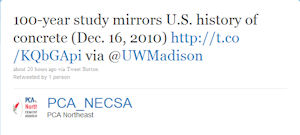 Several months ago, I read some blog posts about frustration with Gov 2.0 not doing enough and a few other posts with offers from people interested in working for free for experience. The two seemingly unrelated topics got me wondering: How could our city use Gov 2.0 to offer job opportunities to people just looking for experience and also offer opportunities to citizens interested in participating in government? My thoughts drifted to the projects I’m working on at my job. And I wondered if our city could reach out to these people with the use of Gov 2.0 tools to help us complete some of our projects. One particular project rose above the others as a perfect candidate – the creation of a database documenting all properties in which the city holds some interest. It seemed possible because all the research could be done online by anyone with a connection to the Internet.
Several months ago, I read some blog posts about frustration with Gov 2.0 not doing enough and a few other posts with offers from people interested in working for free for experience. The two seemingly unrelated topics got me wondering: How could our city use Gov 2.0 to offer job opportunities to people just looking for experience and also offer opportunities to citizens interested in participating in government? My thoughts drifted to the projects I’m working on at my job. And I wondered if our city could reach out to these people with the use of Gov 2.0 tools to help us complete some of our projects. One particular project rose above the others as a perfect candidate – the creation of a database documenting all properties in which the city holds some interest. It seemed possible because all the research could be done online by anyone with a connection to the Internet.
Fortunately, my supervisor and city administrator were fully supportive of implementing this idea. And even better, an intern working for us who is a public administration graduate student was able to partner with us to set it all up. While we were planning the project, I noticed a post on GovLoop written by Dave Briggs: The need for micro-participation. It seemed to discuss exactly what we were hoping to do. His post and support of the idea of micro-volunteering inspired me to finish setting up the project. After it was complete, we took some time evaluating it. After getting some great input from everyone, the project became an adventure of discovery with a Viking theme complete with a Viking figure donated by our wastewater division staff. Now anyone can join us on a discovery of property. And people can even earn titles and rewards as they successfully complete documentation of areas. You can check out the site here: The Geneva Land Adventure.
While we realize this approach has been used before to crowdsource genealogy databases, we’re not sure if other local governments have offered similar opportunities for micro-participation. We would be interested in hearing from others who might be aware of similar examples of participation or information about property management systems already in place. And we would love to hear comments or suggestions for improving the project and would love it even more if you signed up and participated in our adventure! (And because property management in local government is not a widely discussed or known topic, I offer a little background below.)
A INTRODUCTION TO PROPERTY MANAGEMENT FOR LOCAL GOVERNMENT
People are usually surprised to discover that local governments have a significant number of interests in real estate or property. These property rights can be held in the form of deeds, dedications, easements, rights of way, or licenses. And, depending on a government agency’s size, the number of documents conveying these rights can range from hundreds to thousands.
What also surprises people is that agencies most likely do not have a property database in place to document and manage the property rights associated with these documents. When I started working at the city of LaSalle in 1993, I figured they didn’t have this in place because they were somewhat of a small community with a population of about 9700. So I got to work building the database and putting a management system in place. By the time I left in 2009, I had discovered about 300+ properties in which the city had some ownership right. What I’ve since realized from talking to others in government is that many cities lack a property database.
Based on my experience in LaSalle, I have developed a process of building the database and putting in place a management system. One of the first steps is to discover all the documents in which an agency has property rights. But this task can take significant time. Since starting a new job with the city of Geneva two years ago, I’ve been working on setting up the system here. Fortunately we already have most of the property held by deeds in a database created by the county tax assessor. But this information needs to be verified and all the other documents covering easements, licenses, dedications, etc. need to be discovered.
Some might wonder if it’s so much work, why bother. Well, in government, ownership and property rights come up frequently throughout the day. Most activities that go on in local government, particularly in public works or property maintenance, involve the need to know what can be done where. If a database does not exist, research must be done each time a question about rights or ownership comes up. With a completed database and GIS, the answers are much more readily available. There are other benefits, but to keep it brief, the bottom line is having the database saves time and money which is always a good thing to achieve in government.



